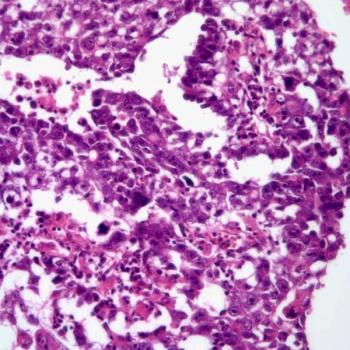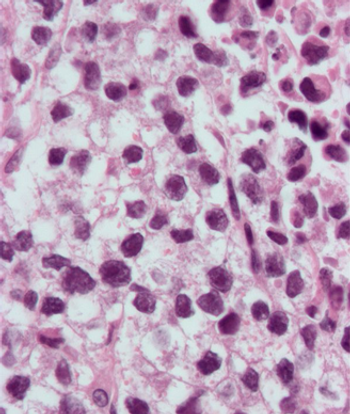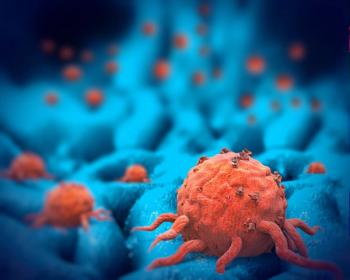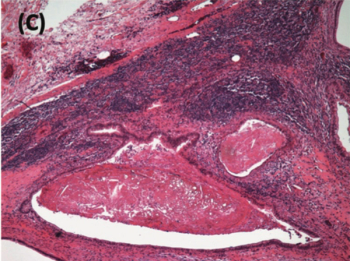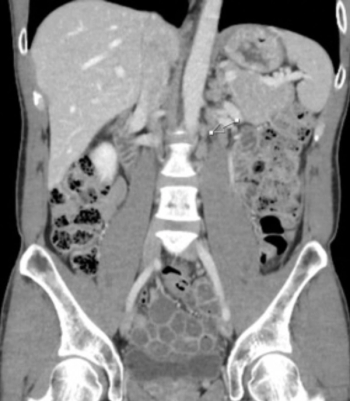
Oncology NEWS International
- Oncology NEWS International Vol 11 No 2
- Volume 11
- Issue 2
New Regimen Prevents Relapse in Testicular NHL
ORLANDO-Patients with primary testicular lymphomas treated with CHOP plus intrathecal methotrexate and scrotal radiotherapy had no testicular or central nervous system (CNS) relapses in pilot study data reported by researchers from
ORLANDOPatients with primary testicular lymphomas treated with CHOP plus intrathecal methotrexate and scrotal radiotherapy had no testicular or central nervous system (CNS) relapses in pilot study data reported by researchers from M.D. Anderson Cancer Center. Andreas Sarris, MD, recently retired as professor of medicine, presented the data as a poster at the 43rd Annual Meeting of the American Society of Hematology (ASH abstract 1457).
"Even after doxorubicin-based therapy, non-Hodgkin’s lymphomas involving the testis have a 34% probability of relapsing in the CNS, and a 21% probability of relapsing in the contralateral testis, by 10 years," Dr. Sarris told ONI. "Our question was whether treatment with CHOP, intrathecal methotrexate, and scrotal radiotherapy would prevent testicular and CNS relapses in patients with primary testicular lymphoma."
He reported data on 20 patients with histologically proven lymphoma involving the testis, no prior lymphoma, no prior lymphoma therapy (except for orchiectomy), and no HIV infection.
The combination treatment produced complete responses in 18 of 20 patients (90%). Two patients had primary refractory disease. Dr. Sarris said there were no CNS or testicular relapses. There was one toxic death (5%) from neutropenic sepsis. One patient who achieved a complete response relapsed in the liver, was salvaged with stem cell transplantation, and remained in complete response 49 months later.
The regimen included six cycles of CHOP plus optional G-CSF (Neupogen) and concurrent intrathecal methotrexate followed by 30 cGy of scrotal radiotherapy. For prophylaxis, methotrexate was given at 12 mg/wk for 4 weeks. Patients with overt CNS involvement received methotrexate at 12 mg every 3 to 4 days to clearance, then four more injections.
The patients’ median age was 59 years (range, 19 to 82). All had diffuse large B-cell lymphoma. Ann Arbor stage was I in 12 patients, II in 3 patients, III in 1 patient, and IV in 4 patients. Only one patient had B symptoms. Serum beta-2-microglobulin exceeded 3 mg/L in 22% of patients, and 30% of patients had International Prognostic Index (IPI) scores of 2 or greater.
With a median follow up of 32 months, Dr. Sarris reported 3-year progression-free survival of 85% and overall survival of 71%. The 3-year progression-free survival was 90% for patients with IPI of 0 or 1 vs 67% for those with IPI of 2 or greater, but this difference was not statistically significant.
"We believe that CHOP, intrathecal methotrexate, and scrotal radiotherapy may have prevented CNS and testicular relapses. This regimen is being tested further by International Extranodal Lymphoma Study Group Protocol IELSG-10," said Dr. Sarris, who is principal investigator for that trial.
Articles in this issue
about 24 years ago
R115777 Has Significant Activity in CML and Myelofibrosisabout 24 years ago
National Cancer Prevention Campaign Discussedabout 24 years ago
CHOP Plus Rituxan Proves Cost-Effective in B-Cell Lymphomaabout 24 years ago
Lung Cancer Screening Protocol Moves Forwardabout 24 years ago
Cancer Prevention Research Hampered by Lack of Biomarkersabout 24 years ago
Rituximab Improves Efficacy of Chemotherapy for Follicular Lymphomasabout 24 years ago
Long Survival Confirmed in CML Patients Who Respond to InterferonNewsletter
Stay up to date on recent advances in the multidisciplinary approach to cancer.


